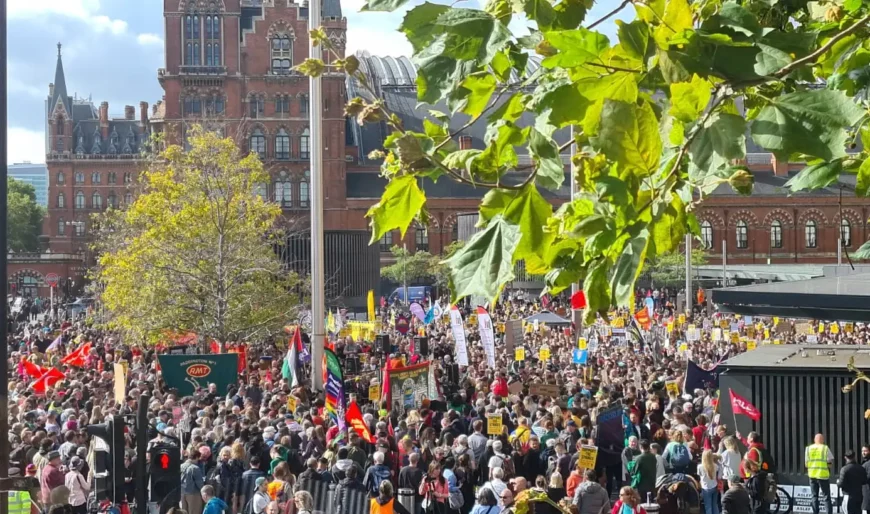Adrian Weir
Adrian Weir has a background in the engineering industry in Southampton where he was an AUEW lay representative (shop steward/safety... Read more »
The only person in this sorry episode of the Strikes (Minimum Service Levels) Bill who is using coercive powers is the Secretary of State himself

Apparently, a theoretical justification for the Tory anti-union laws stretching back to the Thatcher years in the 1980s was to make real Hayek’s nostrum, set out in the Road to Serfdom, that to be free a state had the break the union monopoly over the terms on which labour is supplied.
It is almost ironic therefore that Grant Shapps, aka Michael Green, is assuming that after 40 years of anti-union laws unions still maintain some sort of monopoly of coercive power over their members when he seeks to impose his minimum service levels; he obviously believes that unions can switch on and off at will the supply of labour in any given sector.
The only person in this sorry episode of the Strikes (Minimum Service Levels) Bill who is using coercive powers is the Secretary of State himself. Coercing unions under threat of dire financial penalties to direct their members to go to work; coercing workers with threat of dismissal, with no recourse to the courts, if identified as having to attend their work but declining to do so.
So, let’s look in some detail at this pernicious Bill, which is very difficult as it’s only a page and a half long.
Firstly, it’s clear that the Bill is a massive power grab by the Secretary of State. All power will rest in that office holder to determine minimum service levels in the six services identified:
Given that the Secretary of State and the civil servants will have no real knowledge of the industries concerned, nor any inclination to learn, we may suppose that the minimum service level will be set at so high a level as to render any strike completely and utterly ineffective, limited to a non-observable protest by the few members who will be allowed to continue with strike action.
Echoes of the early years of Italian fascism here perhaps. Mussolini, in 1919, argued that workers had a right to strike to achieve “parity” with the employers but their strike must not interrupt production.
MSLs will do something similar, workers will retain a right to strike in these six sectors but will be denied the opportunity to exercise that right, most having to go to work to provide the minimum service (not interrupting production).
Secondly, once the Secretary of State has determined the level of the minimum service the employer in the sector concerned, after “consultation” with the union, will issue a “work notice” identifying the individual workers who will have to work to provide the minimum service. Any worker who declines to attend work may be dismissed and will lose any protection to issue proceedings for unfair dismissal.
Next, the union is required to take “reasonable steps” to ensure that its members identified in the “work notice” comply with it and attend their work. Should a union not take these “reasonable steps” it would lose its immunity from being sued and will be liable for damages claims in the courts. A union that maintained its support for its members would then leave itself open for contempt proceedings and sequestration of its assets.
We should remember that the authoritarian streak that runs all through this Government has been shown in Sunak himself. In response to the strike wave that has continued through the summer, autumn and into the winter he has not sought to resolve the root causes but has reached for the authoritarian option so favoured by Margaret Thatcher.
As well as the current minimum service levels that he has Shapps proceeding with Sunak also considered either a ban on union membership in certain of these services, as Thatcher did at GCHQ in 1984 (since repealed) or a ban on strike action in certain of these services, as Thatcher’s successor John Major did with the prison service in 1994 (still in force).
On occasions over the past 40 years the TUC has taken the UK Government to the UN’s International Labour Organisation; the tripartite body that establishes international labour standards. For 40 years the ILO has condemned the UK anti-union laws as being incompatible with its Conventions 87 and 98 on the right to form and join a union, the right to organise and the right to bargain collectively. For 40 years the Conservatives have ignored the rulings of the ILO.
In 2023 suddenly the Conservatives became great friends of the ILO, claiming its minimum service level proposals are compatible with ILO standards. That lasted about as long as a snowball in hell; the ILO quickly rebutted the Government’s claim of compatibility.
The TUC may again try for a win at the ILO in Geneva but the courts and other legal routes are unlikely to force a victory for us. We have just passed the fiftieth anniversary of the Pentonville Five when mass resistance by organised workers eventually defeated the Conservative’s Industrial Relations Act. It won’t be a replay but that will be the way to go.
This piece was originally published on Labour Outlook.
Adrian Weir has a background in the engineering industry in Southampton where he was an AUEW lay representative (shop steward/safety... Read more »
Minimum Prospects: the Government’s latest attack on Workers’ Rights